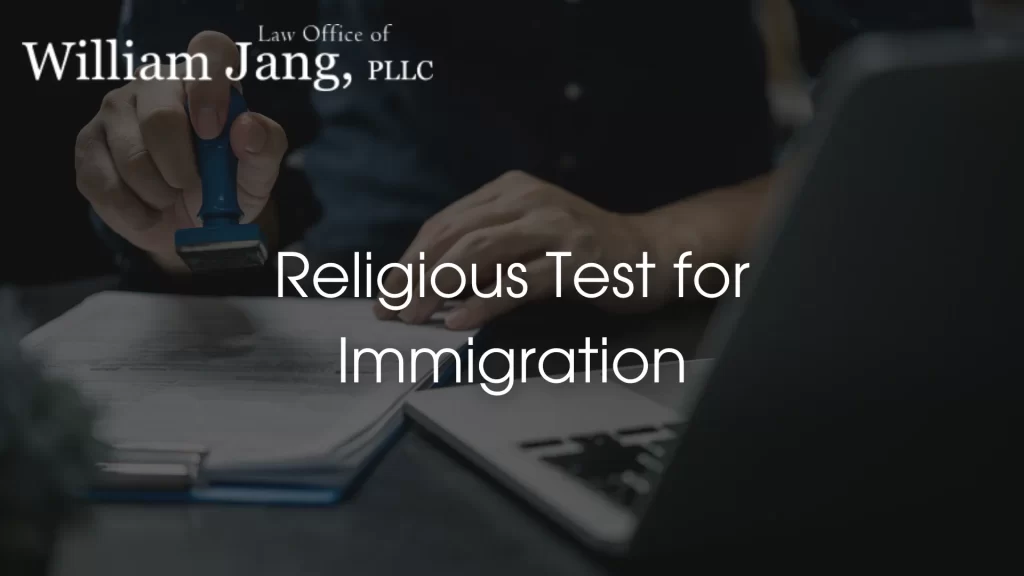
Does the U.S. impose a religious test for immigration? Officially, the United States does not use religion as a criterion for admitting or barring immigrants. However, some argue that recent policies have indirectly amounted to a religious test, significantly impacting Muslim immigrants. Therefore, this post will explore the complex issues around religion and immigration.
The U.S. Constitution Prohibits Religious Tests
The U.S. Constitution forbids religious tests. Article VI states that “no religious test shall ever be required as a qualification to any office or public trust under the United States.” The First Amendment also enshrines religious freedom and prohibits the government from favoring or disfavoring any religion. As a result, these principles unequivocally apply to both citizens and immigrants alike.
The Establishment Clause of the First Amendment prevents the government from establishing an official religion or preferring one religion over others. The Free Exercise Clause protects the right of individuals, including immigrants, to practice their religion freely, and congress shall make no law about it. These constitutional provisions create a strong barrier against religious tests in any government policy, including immigration to allow immigrants to engage in religious expression.
Past Policies Accused of Targeting Muslims
Despite constitutional protections, some recent policies have been accused of unfairly targeting immigrants from Muslim-majority countries:
- The 2017 “travel ban” blocked entry from several predominantly Muslim nations. Critics argued it was a pretext for religious discrimination. The Supreme Court ultimately upheld a version of the ban.
- Heightened surveillance and tracking of immigrants from Muslim countries has raised concerns about profiling based on religion.
- Questioning Muslim immigrants about their religious beliefs and practices by immigration officials has been criticized as improper scrutiny.
Opponents argue that such policies create a de facto religious test for immigration that disproportionately impacts Muslim immigrants, even though they aren’t explicitly based on religion. Moreover, they point to statements from policymakers that seem to reveal anti-Muslim bias, which they see as evidence that religious group discrimination is a motivating factor behind these measures.
Supporters counter that they did not violate the establishment clause and policies address legitimate national security concerns and don’t target any specific religion. They argue that the government has the right to vet immigrants from countries with a higher risk of terrorism, regardless of the predominant religion in those nations. Proponents also note that the policies have been revised to include some non-Muslim countries and allow for case-by-case waivers.
The Legal Landscape Remains Unsettled

Federal courts have reached differing conclusions on policies accused of religious bias against immigrants. There is active debate and litigation around what counts as an impermissible religious test in immigration policy.
Some rulings have struck down policies seemingly motivated by anti-Muslim sentiment. For example, a federal judge blocked the travel ban, citing statements from then-candidate Donald Trump calling for a “total and complete shutdown of Muslims entering the United States.” The judge found that such comments strongly indicated that the ban was rooted in religious animus rather than genuine national security concerns.
Other decisions have sided with the government’s authority to set immigration policy based on national security grounds. The Supreme Court ultimately upheld a revised version of the travel ban, finding that it was neutral on its face and within the president’s broad powers over immigration. The Court’s majority opinion emphasized that the policy included some non-Muslim countries and had a system for granting individual exemptions.
The lack of clear precedent leaves the boundary between valid immigration restrictions and unlawful religious tests ill-defined. The Supreme Court may need to clarify the standards in future cases. Some legal scholars have proposed tests for evaluating whether a policy crosses the line, such as whether a reasonable observer would view it as motivated by religious hostility. However, no one has yet accepted a universally accepted legal standard of the implications and exceptions of the religious test
Looking Ahead and Seeking Legal Guidance
As the U.S. grapples with problematic issues related to religious freedom and immigration, the legal landscape continues to evolve. Policies and court rulings may change quickly.
Immigration attorneys strongly encourage immigrants with concerns about religious discrimination in the immigration process to seek their advice. Qualified lawyers can advise you about how the latest developments impact individual cases.
The Law Office of William Jang, PLLC has extensive experience assisting clients from all backgrounds with immigration matters. Our firm understands immigrants’ challenges and anxieties, especially when confronting potential religious bias. If you believe you have faced unfair religious scrutiny, call the Law Office of William Jang, PLLC at (512) 323-2333 or contact us online to discuss your rights and options. Our knowledgeable Austin attorneys will provide personalized guidance and forceful advocacy to protect your freedoms.
The United States has a proud tradition of religious diversity and freedom. Immigrants of all faiths have contributed immensely to the nation’s success. Upholding the constitutional principles that welcome immigrants regardless of religion is essential to preserving that legacy. As legal challenges continue, the Law Office of William Jang, PLLC remains committed to fighting for immigrants’ rights and helping them pursue the American dream free from religious discrimination.








